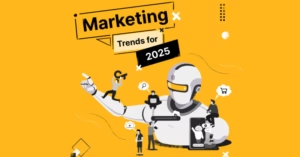Hey there! If you’re like most business owners or digital marketers, you’re probably wondering how to stay on top of SEO trends as we head into 2025. SEO is no longer a one-size-fits-all strategy; it’s evolved into a dynamic, ever-changing discipline. To keep your website ranking and performing well, you need to adapt and stay ahead of the game. Don’t worry – in this guide, I’ll walk you through the latest SEO trends and best practices you need to know for 2025, in a way that’s easy to understand and implement.
Why SEO Still Matters in 2025
Let’s get something straight: SEO is far from dead. In fact, SEO has never been more important than it is today. If you’re running an online business or managing a website, search engines like Google are still the main avenue through which most people discover new products, services, and content. Whether you’re building your brand, generating leads, or driving sales, organic search is a key player in your digital marketing strategy.
In 2025, SEO is about much more than just keywords. It’s about offering real value to your audience and aligning with Google’s ever-evolving algorithms. With that in mind, let’s dive into the key SEO trends and practices for 2025!
1. The Era of AI and Automation in SEO
One of the most exciting trends in SEO for 2025 is the rise of artificial intelligence (AI) and automation. Tools like Google’s RankBrain and BERT have already shifted the way we think about search intent and content creation. But in 2025, AI will be even more integrated into SEO strategies.
AI-powered tools are improving everything from keyword research to content optimization. If you’re not leveraging AI to generate insights or automate repetitive SEO tasks, you’re missing out. But don’t worry – this doesn’t mean you should abandon human creativity. The real magic happens when AI complements your efforts, allowing you to focus on higher-level strategy.
What to Do:
- Use AI-powered tools like Surfer SEO, Jasper AI, or Copy.ai for keyword research, content optimization, and even content creation.
- Automate repetitive tasks like checking broken links, ranking reports, or monitoring SERPs.
2. User Experience (UX) is Now the Core of SEO
Search engines like Google are no longer just looking at keywords – they’re also looking at user experience (UX). With Google’s Core Web Vitals update and the increasing importance of mobile-first design, your website’s user experience is crucial for ranking. If visitors can’t easily navigate your website or if it’s slow to load, they’re bouncing out. And trust me, Google notices.
In 2025, user signals like bounce rate, time on page, and page speed will continue to weigh heavily in search rankings. A seamless, fast, and mobile-friendly experience will be critical for SEO success.
What to Do:
- Optimize your website for mobile users with responsive design.
- Improve page loading speed by compressing images and using browser caching.
- Enhance the overall UX with clean, intuitive navigation and a straightforward call to action.
3. E-A-T: Expertise, Authoritativeness, and Trustworthiness Are More Important Than Ever
Google’s E-A-T (Expertise, Authoritativeness, and Trustworthiness) has always been important for SEO, but in 2025, it’s going to matter even more. Google wants to ensure that the content it shows users is not only relevant but also credible and trustworthy. This means that businesses and websites need to establish themselves as authorities in their niche.
To boost your E-A-T score, create high-quality, well-researched content, and make sure your website has credible backlinks from authoritative sites. Also, showing your qualifications, including author bios or certifications, can help build trust with both Google and your audience.
What to Do:
- Publish authoritative content backed by research, studies, and expert opinions.
- Include clear author bios with credentials to establish trust.
- Focus on acquiring high-quality backlinks from authoritative sources in your industry.
4. Voice Search Optimization: A Game-Changer for SEO
With the explosion of smart speakers, voice assistants, and mobile searches, voice search is becoming a critical aspect of SEO in 2025. People are using voice commands to ask questions in a more natural, conversational tone, which means SEO strategies need to evolve to account for this.
The key to voice search optimization is focusing on natural language and question-based keywords. Think about the questions your target audience might ask and tailor your content to answer them directly.
What to Do:
- Optimize for long-tail, conversational keywords (e.g., “What are the benefits of digital marketing?”).
- Focus on structured content like FAQ sections to answer voice queries directly.
- Implement Schema Markup to help search engines understand your content.
5. Video SEO: It’s Time to Get Visual
If you haven’t yet embraced video as part of your SEO strategy, 2025 is the year to do so. Video content is dominating online interactions, and platforms like YouTube are second only to Google in search volume. Plus, Google is now showing video results directly in SERPs. So, optimizing your videos is crucial if you want to stand out.
Video SEO is about more than just uploading a video to YouTube. You need to ensure your videos are optimized for both the search engines and your viewers. This includes creating engaging titles, descriptions, and even using closed captions to increase accessibility.
What to Do:
- Optimize video titles and descriptions with relevant keywords.
- Create engaging thumbnail images to encourage clicks.
- Add captions and transcripts to your videos to improve accessibility and SEO.
6. Semantic Search and Content Optimization
Google’s algorithms have gotten smarter in understanding the context behind queries, not just the individual keywords. This means semantic search is gaining more importance in SEO. Content that’s contextually relevant and answers the user’s intent is rewarded with higher rankings.
You need to go beyond just targeting a list of keywords. Focus on providing in-depth, well-rounded content that answers a variety of questions related to your primary topic.
What to Do:
- Focus on topic clusters rather than isolated keywords.
- Create comprehensive content that answers all facets of a user’s query.
- Use tools like LSI keywords (Latent Semantic Indexing) to find related terms and phrases.
7. Local SEO: Hyper-Targeting Your Audience
For businesses with a physical presence or a local target audience, local SEO will continue to be a powerful tool in 2025. Optimizing your Google My Business profile, collecting positive reviews, and targeting local search terms will be key to standing out in your community.
Google’s algorithms are getting better at understanding local context, so if you’re not optimizing for local search, you’re missing out on a lot of potential business.
What to Do:
- Optimize your Google My Business profile with up-to-date information and images.
- Encourage satisfied customers to leave reviews.
- Use local keywords (e.g., “digital marketing in [city]”) to target your community.
Wrapping It Up: SEO is About People, Not Just Algorithms
In 2025, SEO is all about creating meaningful, helpful experiences for your audience. It’s no longer just about keyword stuffing or trying to outsmart Google’s algorithms. The algorithms are designed to deliver the best, most relevant results to users – and that’s exactly what you should be focused on as a digital marketer.
Embrace new technologies like AI and voice search, improve your website’s UX, and always prioritize user intent over traditional tactics. Stay consistent, keep learning, and remember: SEO is a long-term game.
So, are you ready to level up your SEO game in 2025? The trends are clear, and with the right strategy, you can position your website to thrive in the new year.




